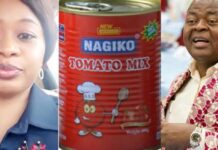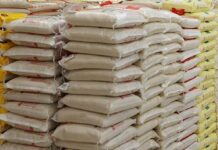By Adie Vanessa Offiong
Women around Zamfara are known to be farmers who work for their husbands or as hired hands on other people’s farms, growing beans (cowpea)or using the crop for commercial purposes. With the newly developed maruca resistant beans, they speak about the kind of impact this would have on their farming, business and meeting up family responsibilities.
Nana Danladi, 40, is a widow and has four children. She had been married for ten years to her husband, Bello who died a while back. She had farmed his land with him. When he died, the land was reclaimed by his family.
The late Bello had explained to her the need to use insecticide on their crops at least eight times in a farming season to prevent insects from ravaging their beans. She however, had to stop spraying the insecticide when she got pregnant with her fourth child and then permanently, after his demise.
Although she now works as a hired hand on other people’s farms, she is happy she doesn’t have to spray the crops with insecticides herself and even happier now that there is a cowpea underway that will be resistant to insects.
She said: “Even if I don’t know how they are doing it, when I heard the owners of the farms I work on talking about it, I asked them. I didn’t understand very well, what they said to me, but I know that this one will not give me too much trouble because when I harvest, I go see the food inside the harvest [sic]. Not like now when insects will make the beans like power or put hole everywhere.”
A’i Danladi is a 50 year-old mother of five. The first of three wives to her husband, Idi, she sells bean cake in the evenings to make extra income. Although she has no details of the nitty-gritty of farming, she knows that it is a nightmare when she plants her beans and hardly has anything to show for it at harvest time because the better part of them have been infested or eaten up by insects.
She said: “That is not the only suffering. When I go to the market to buy what I need for my bean cake, it is costly or I buy bad quality ones because farmers didn’t make bumper harvest. So on any font, I am affected.”
Both women explained what it takes to get anything significant out of their harvest.
They said: “After threshing, we pick and then if it’s for sale it is measured out. If not, we keep it and use it for our business.
It takes the women about an hour to thresh a bag of beans if it is dry. More so, they said: “We have never been paid for threshing beans. It is assumed that we know we should do it.”
As reward for threshing: “We are simply given some of the beans which we consider to be as good as the money since we eat from it and also use it for business which helps our families.”
“We separate the good beans from the bad ones especially when it is business. We use water to separate them and feed the animals the ‘bad’ ones.”
They also said: “The beans without holes produce much more food quantity and cook better, although the cowpea affected by insects does no harm to the health when consumed if it is properly washed and cooked.”
On the market side of cowpea for them, they said: “The price of the beans with holes and the beans without holes is not the same. The beans without holes are much more expensive.”
For Nana who has no husband’s field to work in, her supplementary income comes from, threshing grains such as millet.
On what it cost to buy cowpea for bean cake production, A’i said: “We buy a measure of beans for N500, if you bargain well. When I make bean cake from it, I make an additional N200.”
To alleviate the pressure of female farmers whom they say do most of the work, the women appeal for more and better seeds to be provided for their husbands and farm owners.
It is in this light that the African Agricultural Technology Foundation (AAFT) and the Institute for Agricultural Research (IAR), Zaria, with funding support from the United States Agency for International Development, (USAID), have developed the maruca resistant cowpea for bumper harvest for farmers.
Principal Investigator, Pod-borer Resistant Cowpea Project, Prof. Mohamed Ishiyaku, at a Pod Borer Cowpea Field Day, in Talata Mafara, Zamfara State, said the project commenced in 2009 with provision of the plant gene by AATF.
He said the research became important to develop an insect resistant cowpea as farmers suffer up to 80 per cent yield loss caused by the insect.
Ishiyaku said the seed will be made public by 2018 for farmers and seed companies to have access, after it has been scrutinized by the National Variety Release Committee and registered.
“The improved maruca resistant cowpea can produce 1.6 tons per hectare against the current 600kg per hectare and can be cultivated all year round.”
He also said: “Cowpeas are protected against insects using insecticides sprays and we know insecticides are not only expensive and so many of our farmers cannot afford them, but they are also harmful to our health.”
The don said: “The best way of controlling and containing the insect is to develop a self-protection within the plant, which is called host plant resistant using the approach of breeding. The breeding is within the same family of organisms.”
The project is coordinated by AATF and implemented simultaneously in Nigeria, Ghana, Burkina Faso and Malawi.
In Nigeria, the project has advanced to the stage where farmers are involved in the research as six farmers were selected in each of the three agro-ecological zones (Talata Mafara, Zamfara State, Minjibir, Kano State and Samaru, Kaduna State) to test the seeds for its efficacy and compare with their conventional seeds.
Mu’awi Isa Makura, 60, has been farming beans for 15 years. Sharing his experience he said: “Maruca insect damages our beans and usually causes a lot of problems for us. Sometimes instead of getting 20 bags at harvest per hectare, we end up with 5 to 6 bags per hectare.”
To prevent the damage they buy insecticides for between N5,000 to N6,000 per hectare.
Makura said: “Before it got so bad, during our bumper harvest, we used to sell at N18,000 for one 100kg bag.”
The farmer who is one of the six farmers sampling out the new cowpea in Talata Mafara, said: “The new cowpea will reduce our sufferings financially and it will also reduce our exposure to receding health.
“When we use insecticide, sometimes it affects our health. So instead of spraying eight times per farming season, we only sprayed twice which means our difficulties and health issues have been reduced,” he said.
For the women, this development is a huge relief because: “Even if I have to spray the farm with the insecticide, it wouldn’t be as risky as before when I had to use it eight times,” A’i said.



























